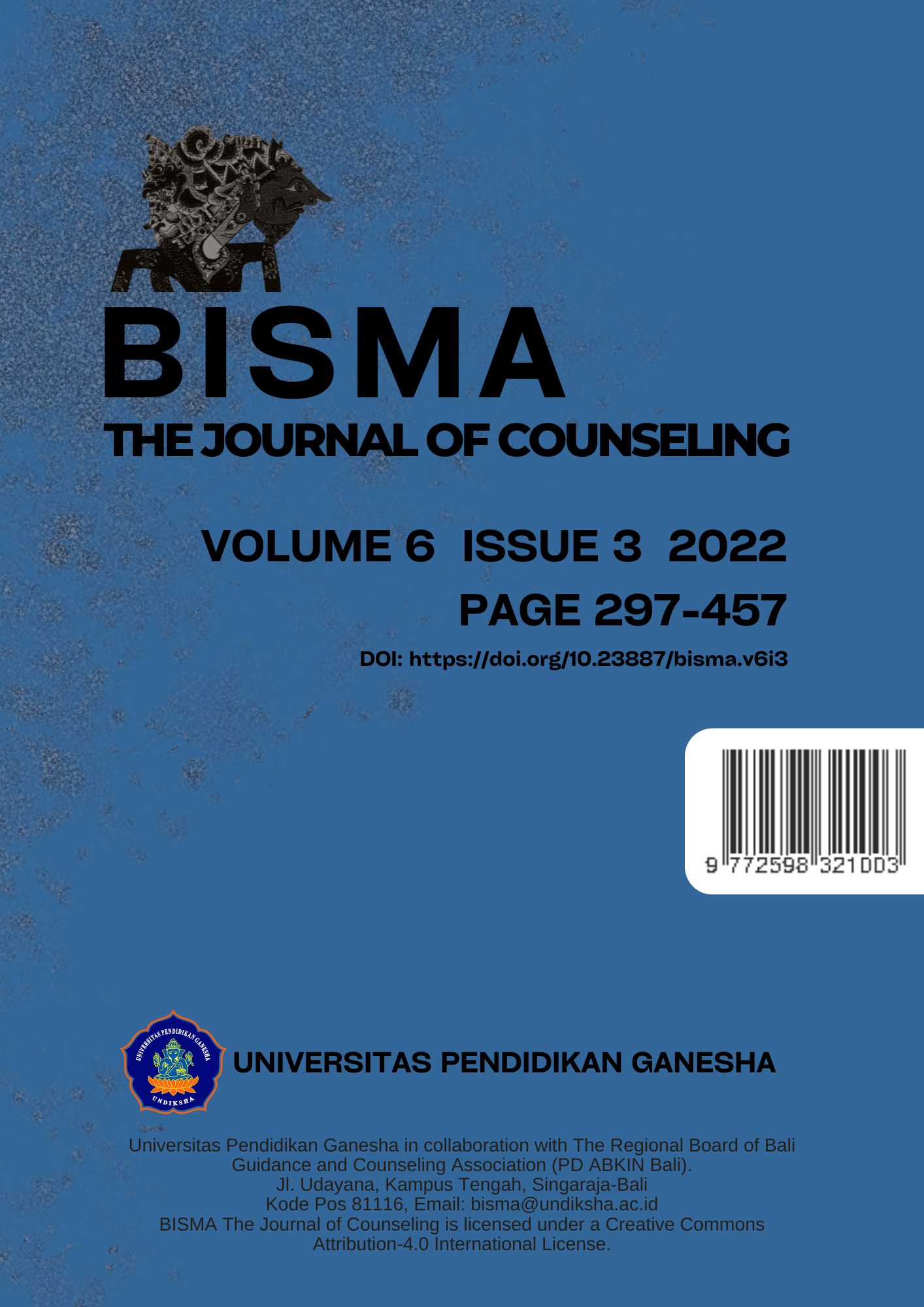A Construct Validity Of The Transferable Skills Scale For Assessment Of Career Guidance
DOI:
https://doi.org/10.23887/bisma.v6i3.52955Keywords:
Transferable Skills, Scale, Career GuidanceAbstract
Transferable skills are abilities and knowledge that can be used in various jobs and career paths and is related to the career development of students in the era of disruption. School counsellors need to understand student profiles related to these basic skill sets in order to be able to design career development programs that are relevant to today's career dynamics. This study aims to construct a transferable skill scale that can be used as a guidance and counselling assessment tool for student career development. The construction of this scale goes through the stages of 1) aspect construction based on literature studies, 2) item creation, and 3) pilot test. The construct validity test used Confirmatory Factor Analysis (CFA). The results of the CFA show that several dimensions of transferable skills require modification of the model until a fit model is obtained.. Thus the scale has a suitable model for measuring transferable skills, which consist of aspects of 1) Communication Skills (7 items), 2) Management Skills (9 Items), 3) Numerical Skills (5 Items), Creativity Skills (6 Items), Social Skills (6 Items), Critical Thinking Skills (5 Items), and Business Skills (6 Items).
References
Bhagra, A., & Sharma, D. K. (2018). Changing paradigm of employability skills in the global business world: A review. IUP Journal of Soft Skills, 12(2).
Charlotte, T. W., Melania, B., Fabien, C., Eva, H., & Gareth, O. (2018). Iden-tifying Transferable Skills and Competences to Enhance Early Career Researchers Employability andCompetitiveness [Research Report].
Farozin, M., Suherman, U., Triyono, Purwoko, B., Hafina, A., Yustiana, Y. R., & Sukmaja. (2016). Panduan Operasional Penyelenggaraan Bimbingan dan Konseling Sekolah Dasar (SD). Direktorat Jenderal Guru dan Tenaga Kependidikan Kementerian Pendidikan dan Kebudayaan Republik Indonesia.
Fede, J. H., Gorman, K. S., & Cimini, M. E. (2018). Student employment as a model for experiential learning. Journal of Experiential Education, 41(1).
Haryono. (2012). Stuctural Equational Modeling: Untuk Penelitian Manajemen Menggunakan AMOS 18.00. PT.Intermedia Personalia Utama.
Holmes, L. (2013). Competing perspectives on graduate employability: Possession, position or process? Studies in Higher Education, 38(4).
Irman, I., Saari, C. Z., Zubaidah, Z., & Yeni, P. (2021). Problem of Career Counseling Management in School During the Covid 19 Pandemic. al-fikrah: Jurnal Manajemen Pendidikan, 9(2).
Kapranos, P. (2014). Teaching Transferable Skills to Doctoral Level Engineers—The Challenge and the Solutions. Open Journal of Social Sciences, 2.
Lumley, M., & Wilkinson, J. (2014). Developing Employability for Business. Oxford University Press.
Marantika, P., & Nugraha, A. M. Y. (2021). Tantangan Konselor pada Sistem Pendidikan Baru. In Usaha Pemberian Layanan yang Optimal Guru BK pada Masa Pandemi Covid-19 (Antologi Esai Mahasiswa Bimbingan dan Konseling). UAD PRESS.
Marsono, M., Purnomo, M., Tuwoso, M., Romlie, M., & Solichin, M. (2017). The Urgency of Transferable Skills Development for Vocational Teachers: A literature review study in Indonesia. International Conference on Technology and Vocational Teachers (ICTVT 2017).
Milanovich, N., & Eagleson, G. (2014). Learning: The Ultimate Transferable Skill. The Way Ahead, 10(02).
Minto, W. (2016). Mudah cepat tepat penggunaan tools Amos dalam aplikasi (SEM). UPN “VETERAN” JATIM.
Muhamad, S. (2012). Graduate employability and transferable skills: A review. Advances in Natural and Applied Sciences, 6(6).
Nägele, C., & Stalder, B. E. (2017). Competence and the need for transferable skills. In Competence-based vocational and professional education. Springer, Cham.
Palladino Schultheiss, D. E., Stead, G. B., & Liao, C. Y. (2019). Ethical Issues in Testing and Assessment. In International Handbook of Career Guidance. Springer, Cham.
Pellegrino, J. W., & Hilton, M. L. (2012). Education for Life and Work: Developing Transferable Knowledge and Skills in the 21st Century. National Academies Press.
Pribadi, H. (2022). Transferable skills Pasca Pandemi. Prosiding SEMDIKJAR (Seminar Nasional Pendidikan Dan Pembelajaran) 5, 447–453. https://proceeding.unpkediri.ac.id/index.php/semdikjar/article/view/1955
Ramirez, C. K., & Lafford, B. A. (2018). Transferable skills for the 21st century: Preparing students for the workplace through world languages for specific purposes. Sabio Books.
Ramos, C. R., Ng, M. C. M., Sung, J., & Loke, F. (2013). Wages and skills utilization: Effect of broad skills and generic skills on wages in Singapore. International Journal of Training and Development, 17(2).
Rocha, M. (2012). Transferable skills representations in a Portuguese college sample: Gender, age, adaptability and vocational development. European journal of psychology of education, 27(1).
Salas, E., Bedwell, W. L., & Fiore, S. M. (2011). Developing the 21st century (and beyond) workforce: A review of interpersonal skills and measurement strategies. In NRC Workshop on Assessing 21st Century Skills. Department of Psychology & Institute for Simulation & Training, University of Central Florida.
Setyorini, N., & Shabrie, W. S. (2020). TRANSFERABLE SKILLS FOR EMPLOYMENT DEVELOPMENT IN INDONESIA. International Conference of Business and Social Sciences.
Siregar, N., Sahirah, R., & Harahap, A. A. (2020). Konsep Kampus Merdeka Belajar di Era Revolusi Industri 4.0. Fitrah:Journal of Islamic Education, 1(1).
Suryahadikusumah, A. R., Nadya, A., & Syaputra, Y. D. (2022). Framework Eksplorasi Karir dalam Model Kampus Merdeka. Edukatif: Jurnal Ilmu Pendidikan, 4(2).
Tymon, A. (2013). The student perspective on employability. Studies in Higher Education, 38(6).
UNICEF. (2019). Global Framework on transferable skills.
Watson, P. (2003). Transferable skills for a competitive edge. Nature biotechnology, 21(2).
Wilhelmus, O. R. (2020). KAMPUS MERDEKA UNTUK MELAHIRKAN MANUSIA UNGGUL DALAM SEMANGAT GOTONG ROYONG. JPAK: Jurnal Pendidikan Agama Katolik, 20(02).
Downloads
Published
Issue
Section
License
Copyright (c) 2022 Ahmad Rofi Suryahadikusumah, Akhmad Harum, Hera Yulia Prabiastuti

This work is licensed under a Creative Commons Attribution 4.0 International License.








